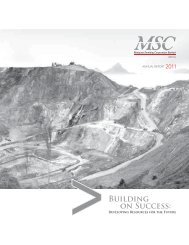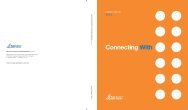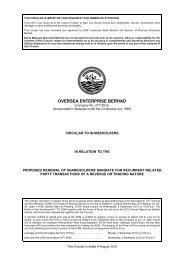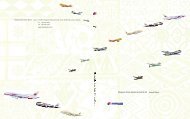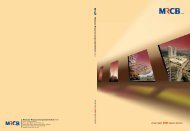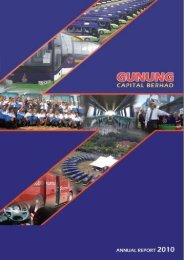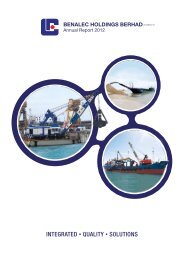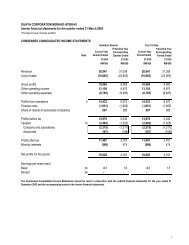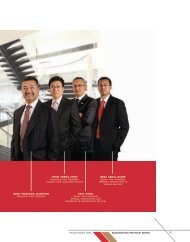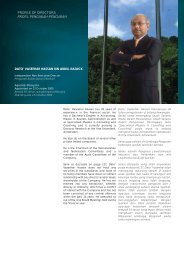Events 2005 - ChartNexus
Events 2005 - ChartNexus
Events 2005 - ChartNexus
Create successful ePaper yourself
Turn your PDF publications into a flip-book with our unique Google optimized e-Paper software.
Notes to the Financial Statements 31 December <strong>2005</strong><br />
5. SIGNIFICANT ACCOUNTING POLICIES (Continued)<br />
5.7 Investments (Continued)<br />
(iii) Other investments<br />
Investments in quoted shares held as short term investments are stated at the lower of cost and market value.<br />
5.8 Impairment of assets<br />
The carrying amounts of the Group’s and Company’s assets other than inventories, deferred tax assets, and financial assets<br />
(other than investments in subsidiary companies), are reviewed at each balance sheet date to determine whether there is<br />
any indication of impairment. If any such indication exists, the asset’s recoverable amount is estimated and an impairment<br />
loss is recognised whenever the recoverable amount is less than the carrying amount of the asset.<br />
An impairment loss is recognised in the income statement immediately except for the impairment on a revalued asset<br />
where the impairment loss is recognised directly against the revaluation reserve account to the extent of the surplus<br />
credited from the previous revaluation for the same assets with the excess of the impairment loss charged to the income<br />
statement.<br />
All reversal of an impairment loss is recognised as income immediately in the income statement except for the reversal of<br />
an impairment loss on revalued assets where the reversal of the impairment loss is treated as a revaluation increase and<br />
credited to the revaluation reserve account of the same asset.<br />
An impairment loss is only reversed to the extent that the asset’s carrying amount does not exceed the carrying amount<br />
that would have been determined, net of depreciation or amortisation, if no impairment loss had been recognised. An<br />
impairment loss is reversed if there has been a change in estimate used to determine the recoverable amount.<br />
5.9 Payables<br />
Payables are stated at cost which is the fair value of the consideration to be paid in the future for goods and services<br />
rendered.<br />
5.10 Provisions<br />
Provisions are recognised when there is a present obligation, legal or constructive, as a result of a past event, when it is<br />
probable that an outflow of resources embodying economic benefits will be required to settle the obligation and a reliable<br />
estimate can be made of the amount of the obligation.<br />
5.11 Employee benefits<br />
5.11.1 Short term employee benefits<br />
Wages, salaries, social security contributions, paid annual leave, paid sick leave, bonuses and non-monetary benefits are<br />
recognised as an expense in the financial year when employees have rendered their services to the Group and the<br />
Company.<br />
Short term accumulating compensated absences such as paid annual leave are recognised as an expense when employees<br />
render services that increase their entitlement to future compensated absences. Short term non-accumulating<br />
compensated absences such as sick leave are recognised when the absences occur.<br />
STAR PUBLICATIONS<br />
(MALAYSIA) BERHAD<br />
121



